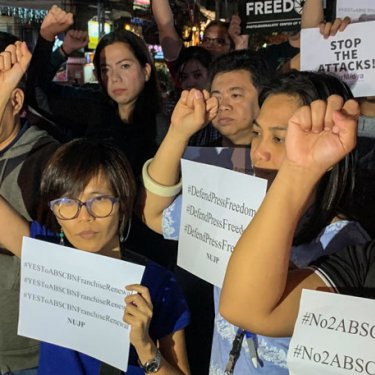Biggest Philippine TV and radio network told to stop broadcasting

An order to stop broadcasting with immediate effect that the Philippine National Telecommunications Commission (NTC) issued today to the country’s biggest TV and radio network, ABS-CBN, would deal a fatal blow to media pluralism if carried out, Reporters Without Borders (RSF) warns.
The order is “effective immediately,” justice secretary Menardo Guevarra said shortly after it was issued by the NTC on the grounds that ABS-CBN’s 25-year franchise expired yesterday after the Philippine congress, which supports President Rodrigo Duterte, rejected all renewal proposals.
The NTC has given ABS-CBN ten days to respond to the order.
Dictatorship
“By systematically refusing to renew ABS-CBN’s franchise, President Duterte’s faction is trampling on the spirit of the 1987 constitution, which enshrines the separation of powers and freedom of the press,” said Daniel Bastard, the head of RSF’s Asia-Pacific desk.
“This network’s TV channels play a major role in providing Philippine citizens with reliable and independent news coverage. If they were to stop broadcasting, media pluralism would be drastically reduced – to the point of recalling the worst period of the Ferdinand Marcos dictatorship and signaling the end of democracy in the Philippines.”
Earlier this year, RSF listed the many threats that President Duterte has made against ABS-CBN, including advising the network’s owners on 30 December to “just sell.” Today’s “cease and desist order” to ABS-CBN is the culmination of a disgraceful offensive by the Duterte administration against independent journalism in the Philippines.
As soon as he was elected president in 2016, Duterte began attacking the “sons of whore journalists” working for independent media outlets. His targets have included the Philippine Daily Inquirer, which the Duterte faction neutralized by acquiring a significant stake in the newspaper.
The authorities have also waged a campaign against the news website Rappler and its founder Maria Ressa, who have been subjected to at least 11 judicial proceedings by various government agencies.
The Philippines is ranked 136th out of 180 countries in RSF’s 2020 World Press Freedom Index, two places lower than in 2019.



